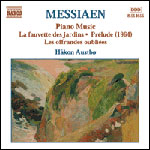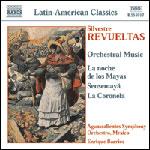
 |
|
 |
|
| About Us |
|
Read Past Issues | Resources | Composer Links |
|
Who's Afraid of Julia Wolfe
|
|
|

Music of Our Time Composer(s): Karlheinz Stockhausen, John Cage, György Ligeti, Wolfgang Rihm Performer(s): Gottfried Michael Konig, Karlheinz Stockhausen, et al. Wergo - #6921 The Big Box of 20th century modernism. Four disks--one each devoted to the music of Stockhausen, Cage, Ligeti, and Rihm--to celebrate Wergo's 40 years at the cutting edge. An outstanding collection and a must have for the serious collector of contemporary music--even if you have some of the pieces on other recordings. |

Rapture / An American Abroad / Jasper Composer: Michael Torke Performer(s): Currie, Alsop, Royal Scottish Nat'l Orch Naxos - #8559167 Michael Torke is among the most talented of the younger generation of American composers. In the past few years he has risen to international prominence with an exciting series of orchestral and ensemble works that explores a unique fusion of jazz, rock, and more traditional classical influences Captured beautifully here are three pieces Torke wrote while serving as composer in residence at the Royal Scottish National Orchestra, Jasper, An American Abroad and the energetic percussion concerto, Rapture, with Colin Currie, soloist. |

Footprints in New Snow Composer: Christos Hatzis Cbc Enterprises - #1156-2 Footprints in New snow is an electroacoustic composition for tape based on prerecorded katajjaq, the vocal games of the Inuit by the Greek-born, Canadian composer Christos Hatzis. The material was recorded on location at Iqaluit and Cape Dorset at Baffin Island from June 15-26 along with interviews with throat singers, respected elders of the community and various environmental sounds of the north. This extensive material was subsequently edited and incorporated in the composition using digital sampling and digital audio technologies. The results are fascinating, often mesmerizing. |

Bram Stoker's Dracula Composer: Wojciech Kilar Performers: Cracow Philharmonic Chorus, Polish National Radio Symphony Orchestra (Katowice), Antoni Wit (conductor). Marco Polo Wojciech Kilar is best-known for his film music although he is also an outstanding composer of orchestral works. Few people alive are better are capturing musical moods and creating a sound world that perfectly matches the images they illustrate. Born in Poland in 1932, and having studied at the Katowice State Music School, he eventually arrived in Paris as a student of Boulenger. He had composed for over one hundred Polish films before moving into the Hollywood industry. |

New American Piano Music Composer(s): David Rakowski, Henry Martin, et al. Performer: Teresa McCollough innova 552 Pianist Teresa McCollough reviewed more than 300 original piano compositions by American composers. and picked the best seven to include on her recital programs and national tours. The result is a exciting and adventuresome program of contemporary music in a variety of approachable styles and of uniform high quality. |

String Quartet No. 3 Composer: Arnold Bax Performer(s): Maggini Quartet Label: Naxos - #8555953 The last and longest of Bax's published quartets sounds like a combination of his earlier two, although that's not bad. Outdoorsy, English cow patty music that sounds best after a spirited day afield, in the company of a big slobbering dog, blowing the heads off small game with a James Purdey, London, shotgun, followed by a good cigar and an Irish whiskey by the fireplace. Ah, sweet motherland.
|

Lo the Full Final Sacrifice & Other Choral Works Composer: Gerald Fenzi Performers: Choir of St John's College, Cambridge / Christopher Robinson, conductor Of Italian Jewish ancestry, Gerald Finzi was among the most English of composers, spending much of his life in the countryside of Hampshire and later near Newbury. His interest in earlier English music and in English literature is reflected in these settings of choral works performed splendidly by the Choir of St. John's College.
|

Fall of Berlin / Unforgettable Year 1919 Composer: Dmitry Shostakovich Performer: Ellena Alekseyeva, piano / Moscow Capella & Youth Chorus / Moscow Symphony Orchestra / Adriano, conductor Marco Polo - #8223897 Shostokovitch was so often in trouble with the authorities that often the only music he could get recorded was zippy patriotic anthems to accompany propaganda films. Fortunately, he had a great knack for creating a hook and his film work was well-known to a populace that had never heard his more important modernist pieces because they had been supressed. The pieces heard here are fine examples of Shostokovitch ability to walk the fine line between blarney and satire. |

Chamber Works Composer: Richard Dubugnon Dubugnon was born in Lausanne in 1968 and began serious studies of the double bass and composition when he was twenty, entering the Conservatoire National Superieur de Musique de Paris in 1990, later moving to London's Royal Academy of Music as a student of Paul Petterson. He combines composition with a career as a double bass player, appearing as soloist with a number of contemporary music groups. These small pieces suggest a young composer with a unique voice and lots left to say. |

Sinfonia Sevillana Composer: Joaquín Turina: Conductor: Martyn Brabbins Performer: Hamish Milne Hyperion - #67326 Turina was one of Spain's greatest composers but his work is unjustly neglected. Lots of fire and passion |

Complete Orchestral Works 3 Composer: Joaquin Rodrigo Performers: Symphony Orchestra of Castille and Leon Naxos - #8555840 Impossibly sunny music, guaranteed to warm your soul in a cold February. If you only know Rodrigo for Concierto de Aranjuez, this superb Naxos series is a revelation.
|

All Rivers at Once Composer: Phillip Schroeder Performer: Duo Savage Capstone - # 8709) Hints of Mahler and the late Romantics run through these lovely pieces performed by Duo Savage, consisting of Susan Savage (oboe and English horn) and Dylan Savage (piano and synthesiser). This is haunting, beautiful, music that transports the listener to a world that is considerably more genteel than one in which we live.
|

Stabat Mater Composer: Francis Poulenc Opus Arte/Distributed by Naxos Poulenc's Stabat Mater, Litanies a la Vierge Noire, and Quatre Motets pour un Temps de Penitence are performed by English choirs (plus the BBC Philharmonic in the Stabat Mater). The performances are first-rate; picture and sound quality are excellent. The disc includes an intriquing documentary on Black Madonnas and a virtual visit to Rocamadour (where Poulenc underwent a religious experience relevant to the music on this program). |

Die Tote Stadt Composer: Erich Wolfgang Korngold Long before Erich Wolfgang Korngold (1897–1957) became one of Hollywood’s most famous film composers, his opera ‘Die tote Stadt’ became a resounding success. The libretto, a many-layered and disturbingly morbid love drama between Paul, mourning for his dead wife Marie, and Marie’s spitting image Marietta, is based on the 1892 symbolist cult novel ‘Burges-la-Morte’ by Georges Rodenbach. This highly acclaimed Strasbourg staging by Inga Levant creates a suggestive spectacle somewhere between Hollywood and Fellini. |

Piano Music Vol. 4 Composer: Olivier Messiaen Performer: Hakon Austbo Naxos - #8554655 Messiaen is this year's flavor of the month as record companies continue to turn out dozens of versions of his works both large and small. This Naxos series is the best bargain of the lot, with wonderful, well-recorded performances that reflect the growth of Messiaen's reputation as one of the giants of 20th century music. |

Orchestra Music Composer: Silvestre Revueltas Conductor: Enrique Barrios Aguascalientes Symphony Orchestra Naxos - #8555917 All the greatest hits of Mexico's best dead composer, performed marvelously by a sympathetic orchestra, at a bargain basement price. If you don't know Revueltas' work, shut down the computer immediately, run to the nearest CD store, plop down your money and prepare to be amazed. |
 |
Search WWW Search www.sequenza21.com |
